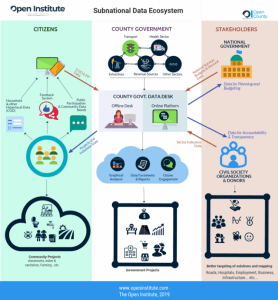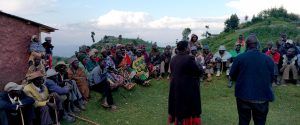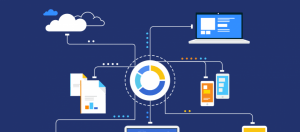Subnational Data Desks Set the Stage for More Efficient, Participatory Development
This blogpost was originally posted on the World Bank site.
One of the more compelling reasons for making investments in data is to strengthen decision making. But this often skews data investments toward meeting the needs of leaders making decisions – especially at the national level. This can reinforce a top-down approach to development.
In Kenya, with the support of the World Bank, the Open Institute has been working with various subnational governments to develop the foundations for consistent use of data to strengthen participatory processes at local levels. The hypothesis is that global development initiatives such as the Sustainable Development GoalsOGP countries are experimenting with open government innovations to accelerate progress on the Sustainable Development Goals, particularly SDG 16+ which includes peaceful, just and inclusive societies... are best achieved not by a top-down approach, but by starting at the village level. Initiatives can then move upwards to the national and global levels. Simply put, we have come to believe that successful development efforts are those that put citizens at the center, and that bring other local stakeholders on board.
To support subnational development efforts, the Open Institute began collecting administrative data from every household in the Lanet Umoja area (a collection of villages) and then sharing the data with citizens. This led to increased data literacy among citizens. It also led to a higher degree of engagement between citizens and the government, which resulted in action–for example, the establishment of a health facility.
The work to date suggests that the availability of locally relevant, disaggregated data, a data-informed citizenry, and an engaged subnational government are all useful in strengthening government effectiveness through mechanisms such as participatory budgeting, transparencyAccording to OGP’s Articles of Governance, transparency occurs when “government-held information (including on activities and decisions) is open, comprehensive, timely, freely available to the pub... More in public procurementTransparency in the procurement process can help combat corruption and waste that plagues a significant portion of public procurement budgets globally. Technical specifications: Commitments that aim t... More, and accountability in service delivery.
Setting up a data desk: The Elgeyo Marakwet case
Counties in Kenya have expressed a need to have good administrative data that can be used together with national statistics.
The Open Institute’s work at the county level was geared to building a data ecosystem that counties can use to exercise better decision making together with their citizens. It was also organized to find ways that counties can consolidate data from diverse sources and analyze them in ways that strengthen service delivery. The data that the counties deal with include national statistics, geospatial and weather data, administrative household data, and data about their own projects (progress, timelines, and financing).
At the heart of the data ecosystem is the county data desk, which is essentially a centralized online and offline platform to collect, collate, analyze, and publish data from multiple sources in a useful way for both the government and citizens. For example, Kilifi county is using its data desk to publish all local project data – including project status – in ways that invite citizen feedback.
For many counties, there is also a major need to attract investors to grow the economy and create employment. Counties like Elgeyo Marakwet are using the data desk to parse detailed information for food processing investors, such as the specific number of mango and avocado trees, weather patterns for the past three years, and the number of qualified youthRecognizing that investing in youth means investing in a better future, OGP participating governments are creating meaningful opportunities for youth to participate in government processes. Technical ... More available to work in this industry.
The data desk is also being used effectively to publish data visualizations through a dashboard so that citizens can weigh competing local priorities, and feel sufficiently informed to participate in a dialogue. Ultimately, its primary purpose is to enable the county government, the national government, and the public to track budgeting, procurement, and expenditure for local development projects.
To support these efforts, the Open Institute has worked closely with the county to provide in-depth training to government data focal points, who ensure that data are processed in a timely manner. There was also a 7-month long fellowship for county staff who specifically staff the data desk.
How can sub-nationalRecognizing that much of what impacts people’s daily lives occurs at the local level, many OGP countries are working to open up lower levels of government by creating commitments focused on subnatio... data initiatives become sustainable (in practice)?
Data initiatives often ignore the role of political factors that shape how data influences decision making and project oversight. Competing incentives, lack of political will, and special interests (as well as corruption) can influence the kinds of data that are collected and how they are used.
The lack of systematic processes and adequate staffing to collect, validate, and publish data can also undermine the value of data initiatives.
Embedding data initiatives in a larger strategic vision can be a way to make them more sustainable. For instance, Elgeyo Marakwet is a signatory to the Open Government Partnership, having joined in 2016. The government’s current open government action plan (for 2018-2020) includes five commitments, which provide context for the daily work of the data desk:
- Ensure transparent and accountable public procurement for oversight on public projects.
- Expand opportunities for civic participation in governance through enhanced access to information and feedback mechanisms including complaints.
- Improve public healthcare service delivery processes and disclosure of medical drug supply chain management decisions and updates.
- Maintain and publish accurate and updatable county development, service and budget data to inform decision-making processes and citizen oversight.
- Strengthen youth empowerment through capacity development.
Using bottom-up approaches (such as the data desk) to gather, streamline, and publish data offers a potential route to more sustainable data management and a way to support broader open government objectives. Moreover, increasing digital and data literacy can empower citizens, who may in turn be able to hold duty bearers to account in a way that can become scalable and sustainable.
No comments yet
Related Content
 Challenges and Solutions
Challenges and Solutions
Faces of Open Government: Ruth Kendagor
IRM researcher of Elgeyo-Marakwet County, Kenya, Ruth shares notable achievements and pending challenges out of the County.

Inclusive Contracting in Elgeyo-Marakwet, Kenya
Lessons from Reformers: Although Kenya requires that 30% of procurement opportunities be allocated to women, youth, and people with disabilities, these groups still face significant obstacles in the procurement market.


Leave a Reply